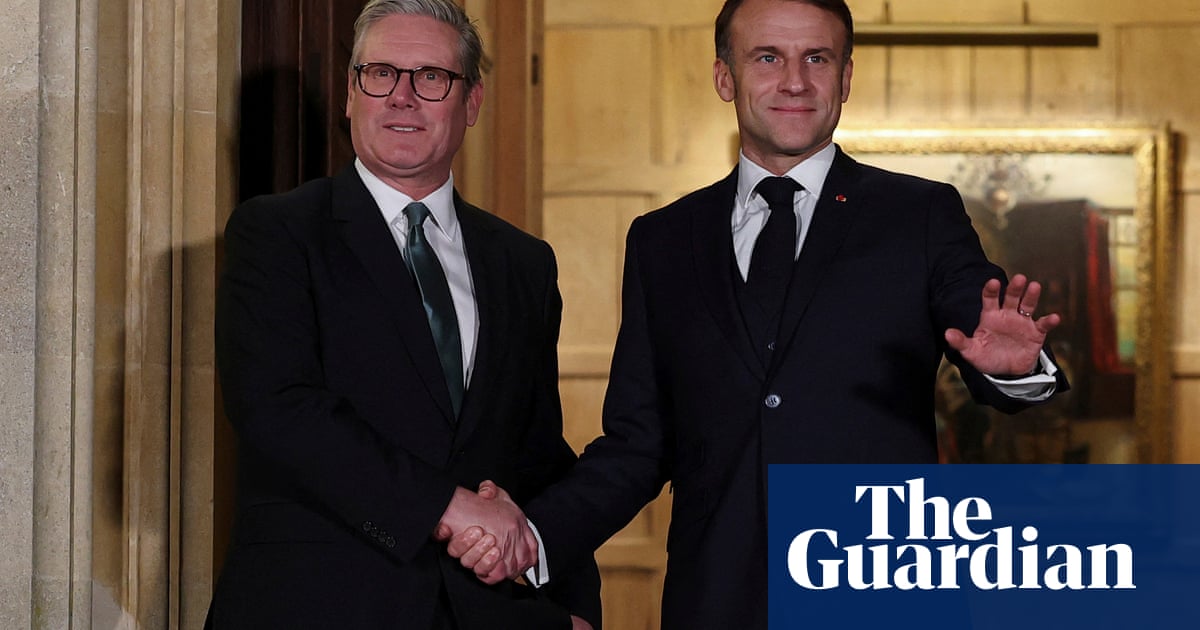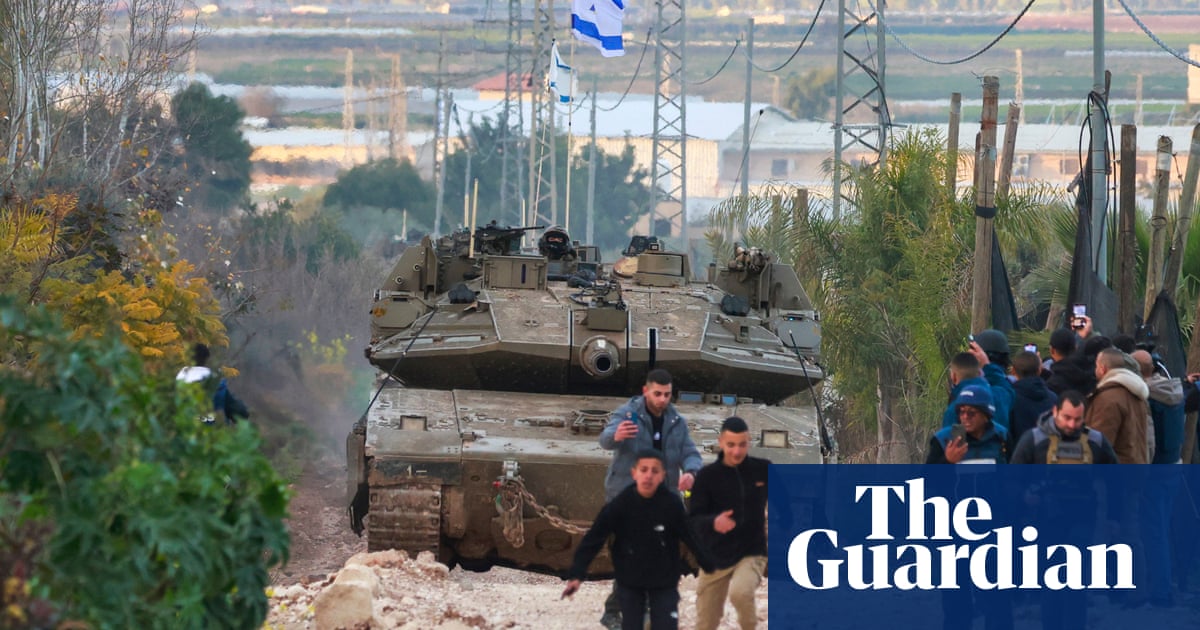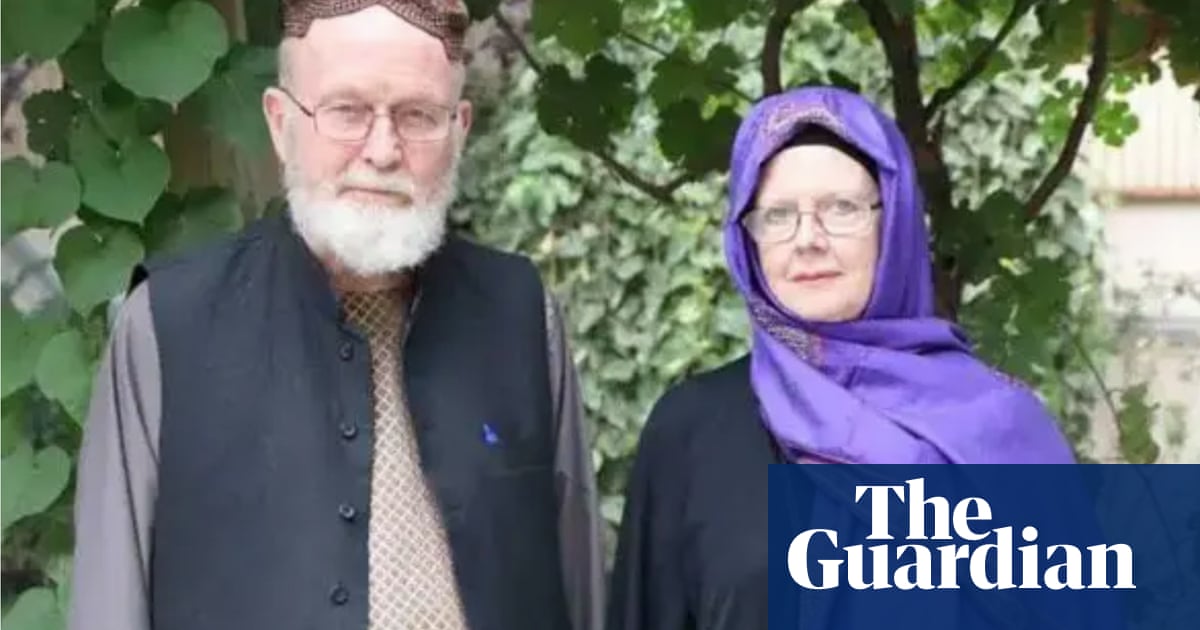Key events Show key events only Please turn on JavaScript to use this feature
Israel and Hezbollah trade attacks just hours before agreed ceasefire
Both sides appeared intent on trading attacks in the final hours before an agreed 60-day ceasefire between Israel and Hezbollah comes into force.
Israeli airstrikes continued to pound Beirut even as Biden announced the ceasefire deal late on Tuesday. Israel’s military issued more evacuation warnings for Beirut’s southern suburbs through the night. Several airstrikes were reported in Beirut.
“Urgent warning to residents of the Beirut area,” army spokesperson Avichay Adraee said in a post on X early on Wednesday, telling people in the Bachoura area in the city centre to leave, as well as “all residents in the southern suburb area”, specifically in Ghobeiry.
Hezbollah said it launched drones at “sensitive military targets” in Tel Aviv on Tuesday evening, after deadly Israeli strikes in Beirut and as news of a ceasefire deal was announced.
“In response to the targeting of the capital Beirut and the massacres committed by the Israeli enemy against civilians,” Hezbollah launched “drones at a group of sensitive military targets in the city of Tel Aviv and its suburbs”, the Iran-backed group said in a statement.
Israeli airstrikes killed at least 10 people in central Beirut on Tuesday, Lebanon’s health ministry said. At least seven people were killed and 37 others injured after Israel launched attacks on 20 targets on the Lebanese capital in just 120 seconds, it said.
Israeli strikes late on Tuesday also targeted Lebanon’s three northern border crossings with Syria for the first time, Lebanon’s transport minister Ali Hamieh told Reuters.
The strikes came moments after the US president, Joe Biden, announced that a ceasefire in Lebanon would come into effect at 4am local time (0200 GMT) on Wednesday.
Opening summary
Hello and welcome to our live coverage of the Middle East crisis. I am Philip Wen.
In two hours, at 4am local time (0200 GMT), we are expecting a ceasefire between Israel and Hezbollah to come into effect. The deal was announced by Joe Biden on Tuesday, after Benjamin Netanyahu’s office said his ministers had approved it.
“This is designed to be a permanent cessation of hostilities,” Biden said.
Lebanon’s prime minister, Najib Mikati, has welcomed the deal as a “fundamental step towards restoring calm and stability in Lebanon and enabling displaced persons to return to their towns and cities”.
The US, EU, UN and G7 had all pushed for a halt in the fighting between Israel and Iran-backed Hezbollah after more than a year of violence.
Biden and the French president, Emmanuel Macron, said the ceasefire would protect Israel from Hezbollah and create the conditions for a “lasting calm”. Macron later said the deal could “open the path” for an end to the war in Gaza.
In the hours before the ceasefire, Hezbollah said it launched drones at “sensitive military targets” in Tel Aviv following deadly Israeli strikes in Beirut.
Here is our full report:
And these are the main developments so far today:
-
Joe Biden, the US president, announced a highly anticipated ceasefire to end the fighting between Israel and Hezbollah. In remarks from the White House Rose Garden, Biden hailed the “historic” deal and said it was designed to be a “permanent cessation of hostilities”. The French president, Emmanuel Macron, who helped broker the ceasefire, was also expected to speak.
-
The 60-day ceasefire between Israel and Hezbollah is due to go into effect at 4pm local time (0200 GMT) on Wednesday. The US is expected to be a key security guarantor. American troops will not be committed to the Israel-Lebanon border but the US, France and its allies would provide the “necessary assistance” to ensure the deal is implemented “fully and effectively”, Biden said.
-
Under the deal’s terms, Israel will withdraw entirely from southern Lebanon, while Hezbollah will move its heavy weaponry north of the Litani River, about 16 miles (25km) north of the border. During a 60-day transition phase, the Lebanese army will deploy to the buffer border zone alongside the existing UN peacekeeping force. Longstanding border disputes will be discussed after the 60-day withdrawal period.
-
Importantly for Israel, Hezbollah dropped its demand that a ceasefire in Lebanon was contingent on ending the fighting in Gaza. The Israel-Hezbollah deal will not have any direct effect on the fighting in Gaza, where US efforts to broker a ceasefire between Israel and Hamas have not led to a deal. “Just as the Lebanese people deserve a future of security and prosperity, so do the people of Gaza,” Biden said during his address on Tuesday. Asked if he would be able to achieve a ceasefire in Gaza before leaving office, Biden crossed his fingers and replied: “I think so. I hope so. I’m praying.”
-
Biden issued a joint statement with his French counterpart, Emmanuel Macron, pledging that both countries would work with Israel and Lebanon to ensure the agreement is “fully implemented and enforced”. “This announcement will create the conditions to restore lasting calm and allow residents in both countries to return safely to their homes on both sides of the Blue Line,” the two leaders said.
-
Biden’s announcement came after Benjamin Netanyahu, Israel’s prime minister, endorsed the ceasefire after his full cabinet approved the deal. Israel’s national security cabinet voted to approve the deal by 10-1, according to the prime minister’s office. The far-right Israeli minister Itamar Ben-Gvir said he opposed the agreement, calling it a “historical mistake” but did not threaten to withdraw from Netanyahu’s ruling coalition.
-
Netanyahu said Israel would retain “complete military freedom of action” and would respond “forcefully” if Hezbollah violated the agreement. In televised remarks after the Israeli security cabinet voted on the proposal, Netanyahu said that there were three reasons to pursue a ceasefire: to focus on the threat from Iran; replenish depleted arms supplies and rest tired reservists; and to isolate Hamas.
-
Lebanon’s prime minister, Najib Mikati, welcomed the ceasefire deal, describing it as a “fundamental step towards restoring calm and stability”. Mikati thanked the US and France for their involvement, and reiterated his government’s commitment to “strengthen the army’s presence in the south”.
-
News of the Israel-Hezbollah ceasefire deal was welcomed by world leaders. The UK’s prime minister, Keir Starmer, called for the ceasefire to be turned into “a lasting political solution”, adding that Britain and its allies would continue to be at the “forefront of efforts to break the ongoing cycle of violence” to achieve a “long-term, sustainable” peace in the Middle East. The president of the EU commission, Ursula von der Leyen, described it as “very encouraging news”.
-
Israeli airstrikes continued to pound Beirut even as Biden announced the ceasefire deal late on Tuesday. With just a few hours to go until the ceasefire went into effect, Israel’s military issued more evacuation warnings for Beirut’s southern suburbs. Several airstrikes were reported in Beirut.
-
Israeli airstrikes struck central Beirut earlier on Tuesday as the Israel Defense Forces (IDF) issued a flurry of evacuation warnings that sent large numbers of people fleeing to safer areas. Israeli airstrikes killed at least 10 people in central Beirut on Tuesday, Lebanon’s health ministry said. At least seven people were killed and 37 others injured after Israel made strikes on 20 targets on the Lebanese capital within 120 seconds, it said.
-
At least 3,823 people have been killed and 15,859 others wounded in Israeli strikes on Lebanon since October 2023, according to the Lebanese health ministry on Tuesday. The latest figures include 55 people killed and 160 injured in strikes on Monday alone, the ministry said.
-
At least 13 people were killed in an Israeli airstrike on a school sheltering displaced families in Gaza City on Tuesday, Reuters reported, citing medics. Dozens of people were also wounded in the strike that hit the Al-Hurreya school in the Zeitoun neighbourhood, medics said. Separately, seven people were killed during an Israeli airstrike on a house also in the Zeitoun area, and an Israeli strike killed at least one man in Gaza’s southern city of Rafah, Reuters said.
-
Israel’s far-right finance minister, Bezalel Smotrich, said it should occupy the Gaza Strip and halve its Palestinian population by the “encouragement of voluntary emigration”. “We can and must conquer the Gaza Strip. We should not be afraid of that word,” Smotrich said at an event late on Monday.

 2 months ago
60
2 months ago
60













































